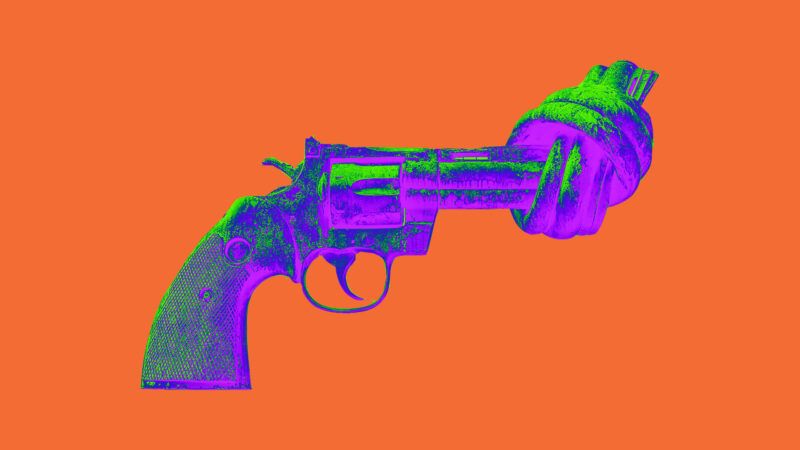Gun Buybacks Don't Seem To Significantly Lower Gun Crimes or Gun Deaths
The policies don't accomplish much more than putting money in some gun owners' pockets.

Since Australia's much-lauded (and much-overstated) gun buyback in 1996, various American localities have tried the same thing, selling the move as a way to lessen gun violence and crime.
But a new study—the first one looking closely at the specifics of buybacks in America—indicates that the policies don't accomplish much more than putting money in some gun owners' pockets.
The study, issued this month by the National Bureau of Economic Research, was conducted by economists Toshio Ferrazares, Joseph J. Sabia, and D. Mark Anderson.
Armchair reasoning based on a basic understanding of human incentives can't settle the question, the researchers explain. Perhaps buybacks will take enough guns out of the hands of marginal criminals to lower crime. On the other hand, maybe people will use the money they get selling crummy old weapons to the government to buy newer, better ones. Or "if criminals believe law-abiding citizens (and potential victims) are relinquishing their firearms, then they may be more willing to commit gun crimes."
So the researchers examined 339 buybacks from 1991 to 2015, in 277 cities and 110 counties. One city—Worcester, Massachusetts—had 14 buyback rounds, and just 53 percent of the cities they examined had only one. So this seems to be a practice that authorities seem to want to keep going back to the well on.
Controlling for "demographic, socioeconomic, and policy controls measured at the county and state levels" that might affect the gun crime and gun death rates no matter what was going on with buybacks, the researchers concluded that "with 95 percent confidence, we can rule out gun crime declines in the 12 months following a [buyback] of greater than 1.3 percent and gun crime declines of greater than 2.2 percent" more than a year after they happen.
They also found that in the immediate two months following a buyback, jurisdictions saw "an increase in incidents of firearm-related crime. The 7.7 percent increase in gun crime…is relatively modest, suggesting at most, two additional gun crimes." They saw no corresponding increase in non-gun crimes in those two months. Breaking down the distinction between violent and nonviolent gun crimes, they found no evidence that buybacks lowered either in the short or the long run.
They broke down the data by demographic groups too, and they found no benefit for any specific group. Indeed, they found "short-run increases in gun crime for those ages 18 to 23…individuals over age 35…males…females…and African Americans."
When they broke their data down to specific places, they did find "significant declines in the rate of gun crime" after buybacks in the Ohio cities of Cincinnati and Columbus. But "in each case, the effect is rendered statistically indistinguishable from zero following the inclusion of a second year of post-treatment data." So the positive effect didn't last long.
So much for gun crimes—what about gun deaths? There too, buybacks don't offer much to recommend themselves. The researchers' probe into the data found "no evidence that firearm-related suicides and homicides declined in the the years following" a buyback, and "no evidence that firearm-related deaths fell relative to non-firearm related deaths" after one either.
They also checked whether a bigger buyback was more effective than a smaller one, and they found no reason to think so. And most buybacks "have a very small effect on the local supply of firearms."
Each specific buyback tended to eliminate 1,000 or fewer firearms, "with city governments generally paying gun owners between $25 to $200 per firearm"—though some went as high as $450 for certain rifle types.
More than half those who sold a gun back still had another gun at home. And more than half of the guns sold were inherited or gifted to the seller to begin with. So if you want to believe we need more, bigger buybacks that somehow only target those who would have used their guns to harm others or themselves, you can keep believing it. But so far, the social science shows that gun buybacks as they actually can be constitutionally executed in the United States do little to reduce gun crimes or gun deaths.


Show Comments (61)